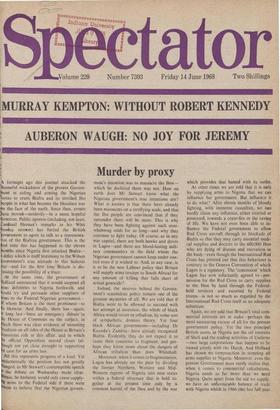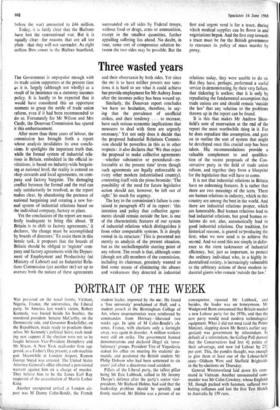Murder by proxy
A fortnight ago this journal attacked the ithameful wickedness of the present Govern-
rnent in aiding and arming the Nigerian trees to crush Biafra and its terrified Ibo people in what has become the bloodiest war the face of the earth. Since then, events awe moved—modestly—in a more hopeful irection. Public opinion (including, not least, Minal Heenan's remarks in his Whit mislay sermon) has forced .the British overnment to agree to talk to a representa- ve of the Biafran government. This is the rst time this has happened in the eleven oaths since Nigeria first attacked Biafra— delay which is itself testimony to the Wilson overnment's true attitude to this hideous ar—and for the first time Britain is dis- ussing the possibility of a truce.
At the same time, the goVernment of ()Hand announced that it would suspend all tins deliveries to Nigeria forthwith, and ould try and persuade other suppliers of rms to the Federal Nigerian government — 1 whom Britain is the most prominent—to o likewise. And finally, there has—again, t long last—been an emergency debate in 4e House of Commons on the subject, in hich there was clear evidence of mounting avulsion on all sides of the House at Britain's onstrous role in this affair, and in which e official Opposition moved closer (al- ough not yet close enough) to supporting e case for an arms ban. , All this represents progress of a kind. Yet ndamentally the position has not greatly enged. as Mr Stewart's contemptible speech the debate on Wednesday made clear. tain, he declared, would only cease supply- arms to the Federal side if there were on to believe that the Nigerian govern-
ment's intention was to massacre the Ibos- which he declared there was not. How on earth does Mr Stewart know what the Nigerian government's true intentions are? What is known is that there have already been massacres on a terrifying scale, and that the Ibo people are convinced that if they surrender there will be more. This is why they have been fighting against such over- whelming odds for so long—and why they continue to fight today. Of course, as in any war capital, there are both hawks and doves in Lagos—and there are blood-lusting mili- tary commanders in the field whom the Nigerian government cannot keep under con- trol even if it wished to. And, in any case, is it to be the new Labour policy that Britain will supply arms (except to South Africa) for any amount of killing that falls short of actual genocide?
Indeed, the motives behind the Govern- ment's scandalous policy remain one of the greatest mysteries of all. We are told that if Biafra were to be allowed to succeed with her attempt at secession, the whole of black Africa would revert to tribalism, by some sort of sympathetic domino theory. Yet four black African governments—including Dr Kaunda's Zambia—have already recognised Biafra. Evidently they do not expect it to cause their countries to fragment, and per- haps they know more about the dangers of African tribalism than does Whitehall.
Moreover, when it comes to fragmentation, Lagos has already set the pace by dividing the former Northern, Western and Mid- Western regions of Nigeria into nine states within a federal structure that is held to- gether at the present time only by a common hatred of the Ibos and by the war
which provides that hatred with its outlet.
At other times we are told that it is only by supplying arms to Nigeria that we can influence her government. But influence it to do what? After eleven months of bloody fighting, with immense casualties, we can hardly claim any influence, either exerted or possessed. towards a cease-fire or the saving of life. We have not even been able to in- fluence the Federal government to allow Red Cross aircraft through its blockade of Biafra so that they may carry essential medi- cal supplies and doctors to the 600,000 Ibos who are dying of disease and starvation in the bush—even though the International Red Cross has pointed out that this behaviour is contrary to the Geneva Convention of which Lagos is a signatory. The 'concession' which Lagos has now reluctantly agreed to—per- mission for the Red Cross to carry supplies to the lbos by land through the Federal- held territory and escorted by Federal troops—is not so much as regarded by the International Red Cross itself as an adequate subititute.
Again, we are told that Britain's vital com- mercial interests are at stake --perhaps the most nauseating excuse of all for the present government policy. Yet the two principal British assets in Nigeria are the oil interests of Shell and the trading activities of Unilever —two large corporations that happen to be owned jointly with the Dutch. And Holland has shown no compunction in stopping all arms supplies to Nigeria. Moreover, even the present Government must surely realise that. when it comes to commercial calculations, Nigeria needs us far more than we need Nigeria. Quite apart from the aid we supply we have an unfavourable balance of trade with Nigeria which in 1966 (the last full year
before the war) amounted to £46 million.
Today, it is fairly clear that the Biafrans have lost the conventional war. But it is equally clear—for reasons that are all too plain—that they will not surrender. As eight million Ibos cower in the Biafran heartland, surrounded on all sides by Federal troops, without food or drugs, arms or ammunition, except in the smallest quantities, further appalling suffering lies ahead. No doubt, in time, some sort of compromise solution be- tween the two sides may he possible. But the first and urgent need is for a truce, during which medical supplies can be flown in and negotiations begun. And the first step towards a truce must be for the British government to renounce its policy of mass murder by proxy.











































